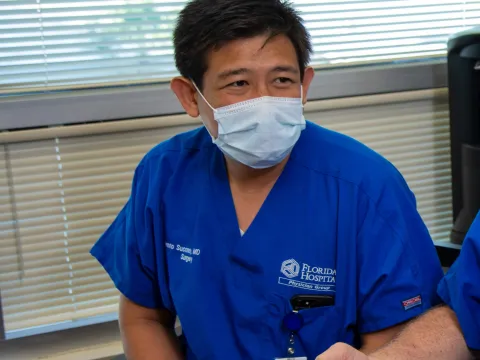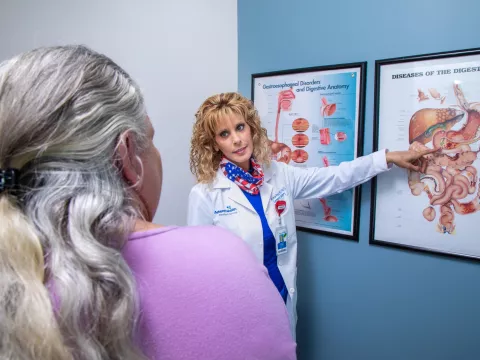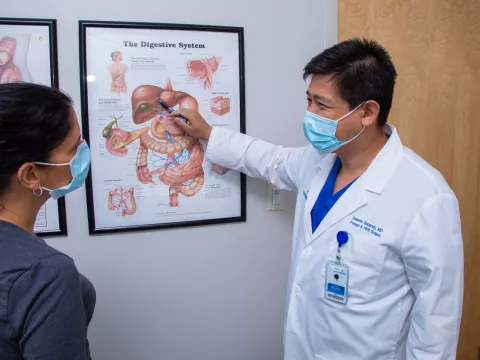- AdventHealth Digestive Health Institute
Choose the health content that’s right for you, and get it delivered right in your inbox.
Even during the COVID-19 pandemic, surgeons Dr. Sharona Ross and Dr. Iswanto Sucandy at AdventHealth Digestive Institute Tampa (DI) have maintained a full schedule of presenting at professional conferences. For now, these meetings have moved to a virtual format. However, they give our surgeons the opportunity to share their expertise with other surgeons, so patients around the country – and even the world – may end up benefiting.
Iswanto Sucandy, MD, FACS, advanced hepatopancreatobiliary (HPB) surgeon, gave one such presentation at the 16th Academic Surgical Congress, held February 2 – 4, 2021. Organized by the Association for Academic Surgery and the Society of University Surgeons, the conference brings together surgeons from many of the top academic hospitals across the United States to share about their leading-edge surgical techniques.
In his presentation, “Robotic Resection of Klatskin Tumor: Outcomes of Initial Resections Using a Modern Approach,” Dr. Sucandy showcased the experience that he and his colleague, Sharona Ross, MD, FACS, an advanced foregut and HPB surgeon at DI, had with using the surgical robot for a certain type of bile duct cancer.
Klatskin Tumor Surgery: Pioneering a Minimally Invasive Operation in Tampa
Surgery to remove a Klatskin tumor is a very technically challenging operation. The majority of surgeons use an open surgical approach to remove it. This involves a large incision in the patient’s abdomen. Although minimally invasive surgery with a laparoscope has become more widespread in recent years, it is still extremely uncommon for surgeons to perform a Klatskin tumor operation with a laparoscopic approach.
As a result of the DI team’s firsthand experience of the countless benefits that minimally invasive surgery provides their patients, they wanted to extend that surgical approach to patients suffering from Klatskin tumor as well. Dr. Sucandy and Dr. Ross had already performed about 250 robotic liver operations out of their total of 450 liver resections with very good results. Klatskin tumor affects the centrally located bile duct outside the liver, near the vessels that supply the liver with blood. Given the DI surgeons’ experience in operating on the liver while assisted by the da Vinci Surgical System, using this same approach for Klatskin tumor made sense to them. The surgical robot would give them the delicate capabilities needed for operating on small bile ducts in and near the liver. It would also allow them to make the fine stitches necessary to reconnect the bile duct from the liver to the small intestine.
Dr. Sucandy shared with the Academic Surgical Congress audience about the DI team’s initial results with robotic Klatskin tumor surgery. Although his presentation looked only at DI’s first eight of these operations, as of publication of this blog post, the center has completed 15 of them.
Dr. Sucandy pointed out that the steps involved with the robotic approach in removing a Klatskin tumor are similar to the open approach. Instead of a large incision across much of the belly, however, patients will need several small, keyhole incisions as well as one about 1-inch wide through which the tumor will be removed. The procedure itself is very complicated, taking about eight hours for the DI surgeons to perform.
The Results Are in: Robotic Klatskin Tumor Surgery Is a Safe and Effective
Even though resecting – or removing – a Klatskin tumor is a highly complex operation, the DI surgeons were able to complete all eight of their first robotic Klatskin tumor cases as closed procedures. This means that the surgeons didn’t have to unexpectedly convert any operation to an open procedure with a large incision for these first eight patients.
Dr. Sucandy concluded that the robotic Klatskin tumor operation, as performed at the Digestive Institute, is safe and feasible. In fact, the robot actually helps the surgeon because of the delicate nature of the surgery required. The robot’s special camera gives surgeons a high resolution, 3D view of the surgical site that they wouldn’t otherwise have.
The patients who had this procedure at DI experienced very good short-term outcomes. Only two were readmitted to the hospital within 30 days, and only three needed an additional procedure to drain fluid after surgery. One of the eight patients even had their entire Klatskin tumor removed by the surgery and required no further treatment.
In addition to presenting about robotic surgery for Klatskin tumor, because of his experience, Dr. Sucandy was asked to moderate a conference session. In this session, other surgeons talked about outcomes with their surgical procedures for cardiothoracic and HPB conditions. Dr. Sucandy asked them questions to guide the conversation so the audience of health care providers could get good information.
Minimally Invasive Surgery in Tampa for Digestive Cancer
Dr. Sucandy and Dr. Ross are longtime proponents of finding treatment solutions that give patients the benefits of minimally invasive surgery: less pain, less blood loss, a faster recovery and a better surgical experience overall. This is especially important for patients with cancer, most of whom will need additional treatment after surgery. A faster recovery after their operation allows them to move on to chemotherapy or radiation therapy sooner. Receiving the next treatment earlier because they healed quickly from surgery can potentially benefit patients’ survival.
If you or a loved one has been diagnosed with a cancer of the digestive system, Drs. Ross and Sucandy at AdventHealth Digestive Institute are committed to seeing you quickly, even for a second opinion. For an appointment with a digestive cancer surgeon skilled in minimally invasive surgery, call Call813-615-7030.





